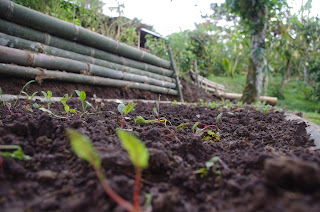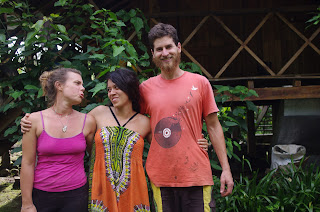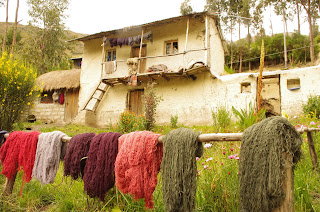Bus rides. They escape description because the nausea, discomfort, alternating heat/cold are not worth conveying in more than a passing phrase. 40 hours later, we had gone from Medellin almost 1500 KM to Montanita – a small town on the Pacific coast of Ecuador. We met Mario, Claire’s uncle, and had the privilege of staying with Mario’s friend (also named Mario), who built one of the first houses in this now bustling tourist town. The waves at Montañita attract thousands of tourists every year, and when we arrived there happened to be a surf competition, which of course increased the number of tourists (who seemed to surpass the number of locals).
 |
| Alex and Mario in Montañita |
While this isn’t our normal form of travel, staying with
Claire’s uncle and his son, and having the opportunity to hang out with their
local friends in this overwhelmingly tourist location made us feel privileged
to know locals and feel that we were connecting in subtle and different
ways. After a wonderful week of sun and
surf, beach and family, we headed north to Los Bancos for a WOOFing opportunity
at a farm called Fincalegre.
We arrived in Los Bancos around 1 PM, and were soon picked
up by a half American, half-Colombian in his late thirties/early forties named Steve. Steve had a short, gray scruff with short,
salt-and-pepper hair, ray-ban spectacles, and a kind, disarming smile. Steve was very friendly with us, and told us
a bit about the farm as we bought supplies and he negotiated in perfect Spanish
with the shopkeeper. Fincalegre had been
purchased by Steve and his fiancée's father about 9 months prior from an
American woman, who had made the farm her life’s work and had planted over 70
varieties of fruit trees – both endemic and exotic.
 |
| After harvesting the plethora of fruits on the farm. |
We were excited to work with Steve, who had a contagious
enthusiasm for the project and casually let us know that, due to the on-going
construction at the Finca, we would be staying in the luxury matrimonial guest
cabin. Steve explained that one other
WOOFer, Miles, had arrived 2 days previously and was staying in the other matrimonial
cabin. We were, to say the least,
excited.
We arrived to the farm to see the lodge: an elaborate, large
wooden house with a 360-degree balcony and flowers and fruit trees,
well-manicured grass, and the beautiful backdrop of bamboo forests. After touring this ‘main cabin’, and meeting
Miles and Tanya (an Ecuadorian tourism graduate employed by Steve to help
establish eco-tourism at Fincalegre), we were shown to our cabin.
 |
| Cacao |
We slept serenely after a night of small talk. One crazy fact: As we were leaving La Fruta (some 3,000 km
away), Claire and I had stumbled upon a young American who looked weary and
lost, coming up the hill. We directed
him to La Fruta, as he thought he was lost and had passed the farm. We assured him it wasn’t much further (he seemed
to need the encouragement). This was Miles (Emilio as he liked to be
called). Incredibly, our paths had
crossed again, and we compared stories and laughed at the uncanny meeting. We wondered aloud why the universe had
brought us once again together and what we might have to learn from each
other. Steve seemed to love having
Americans around, as he was living by himself previously, and while he was born in Colombia, making his first
language was Spanish, was still very American in many ways.
The next day, we began our work of cleaning the innumerous
fruit trees. This involved “crowning”
the trees (clearing leaves and grass under them to allow the moisture to
escape), and pulling off the moss that had grown on all the trunks, leaves, and
branches. The work was meditative, and
we enjoyed speaking with Tanja, Norma (the Finca’s main worker), and
Miles. The work was necessary because
the exotic fruit trees had been planted in what was now a rainforest, and what
– in a few months – would become a cloud forest. It rains every day at Fincalegre, and in the
winter months, the whole jungle is encompassed in cloud and mist.
After a half-day’s work, Steve offered us the tour, and
guided us to the back of the farm.
There, we found a pristine stream which was peppered with deep, crystal
clear pools and cascading, blissful waterfalls.
We swam, ducked behind waterfalls, jumped a few cliffs, and even found a
natural vine which could be used to swing from the waterfall into the
accompanying pool. All of us took some
time to meditate on this incredible place, full of thanks for Steve, who showed
us the place, and of course Pacha Mama (Mother Earth) who made this place and
our own existence possible.
 |
| After a day of "shopping", harvesting fruits on the farm. |
The walk back had us soaked with a delightful, cooling
rain. When we arrived back at the cabins,
we changed out of our wet clothes and rested a bit. We decided not to make a fire, as we would be
leaving for dinner pretty soon. We
walked to dinner delighted at the day, and helped prepare a wonderful meal
which we shared over wine and candlelight. After a few glasses and a wonderful
conversation, heightened by the backdrop of the jungle music, and the amazing
day that we had all shared together relieving trees of unwanted moss and
rejoicing our way through the tropical rainforest, the energy was incredible. We were all so happy, so contented, so
blissful.
Around 11 we decided to call it a night, and the three of us
(Miles, Claire and I), walked back to our cabins. After about 5 minutes walking, away in the
distance we saw a soft, orange glow coming from the east. “Strange,” Claire said, “that almost looks
like the moon, but it’s a new moon and there should be no light” (the moon is
and incredible center of agriculture in many South American cultures, as the
energy omitted from the moon greatly affects plant energy and dictates proper
planting, harvesting, and weeding times for specific types of plants). Indeed, we agreed, this could not be the
moon.Suddenly, Miles’ eyes grew large as he flew into a
panic. “My towel! I left it hanging to dry over the
furnace!” Claire stood
incredulously. I tried to calm him –
come on Miles, we had a few drinks, you’re overreacting, it must be something
else.
But he was already in full sprint
towards to the cabins. Claire jogged
behind, and I waited to see what would come.
Sure enough, after about a minute, Claire yelled back to me “Fire! Fire!
The cabin’s on Fire!”
Which cabin? I ran back to the lodge to tell Steve, and I
can’t help feeling guilty but I must admit – the whole time I was hoping it wasn’t
the cabin we were staying in, assuring myself that there was no way we had burnt anything. I made it out of breath to the lodge, and
told Steve. “There’s a cabin on fire!”
“That’s impossible!” he
said.
“I know, but its happened!”
I ran back to the cabins. As I climbed the hill, I saw that it was in
fact Miles’ cabin. The walls had already
burned, and the structure was steeped in flames, licking over the metal roof
and spewing embers into the heavens. I
remember being surprised at the sound. The
whirl and pulse of the fire could be heard and felt from a long way away, like
a demon’s breath. Miles was frantic,
running around the cabin trying to figure out something to do. He had already burnt his had – he had seen a
faucet handle and tried to open it, singing his had in the effort. He was in shock. We stared disbelievingly. Claire gave Miles, who was on the verge of
fainting, a big and well-needed hug.
I consulted with Claire, who told
me we needed to stay calm and make sure that Steve would be okay. We had just met the guy – who knew what he
would do to Miles when he saw what had happened? It felt like hours of waiting, the long
moments of intense stress and pressure drawn out with thoughts and emotions,
anticipation. Steve arrived, and Miles
told him what happened.
“It’s all gone Steve and it’s all
my fault!” cried Miles.
“What do you mean? All of it!?”
Replied Steve with surprising calm.
“I BURNED IT DOWN STEVE! DOWN TO THE GROUND!” Yelled Miles, “I’ll do
anything I can to make it up to you!”
To Steve’s credit, he stayed
admirably tranquil. He approached the
cabin, and watched by our sides. We
agreed that, due to the rain that had continued to pour from the sky since our
earlier walk, and the green, wet plants surrounding the cabin, the fire would
not spread. An attempt at extinguishing
the fire spreading to the stairs with the household fire extinguisher quickly
proved (in an almost comically inadequate fashion), that this fire would not be
squelched.
There was nothing to do but
watch; to step back, and admire the power of the demon. We learned the lesson: be VERY careful with
fire! It was the most impressive inferno
any of us had ever seen.
Periodically, roof supports would
give way as their strength was conquered by the flames, and the iron sheets
they once supported clattered and crashed to the ground. After about an hour of admiring, grieving,
absorbing, appreciating, we headed to bed.
There was nothing else to do.
 |
| Steve watches calmly while the cabin burns to the ground. |
The next day, Miles went with
Steve to Quito to recover his traveling life – all of Miles’ clothes,
possessions, money, passport, etc. had burned to oblivion. So had his spirits. Steve handled the situation with incredible
composure, and even lent Miles money until he could recover some of his
own. Miles left promising to return to
help pay back the damage he had done. We
did not know what to think, or how his unskilled labor could make up for a
$20,000 (at least) cabin.
 |
| The bamboo planter beds that we made with new baby beets! |
 |
| Saying goodbye to Tanja |
 |
| Julio, who works as a carpenter- working on this amazing table. |
Our energy and enthusiasm at
Fincalegre had, well, burned out...
Here are some pictures from our time in Peru and trips with both of our
Mamas... Haven't found the time to describe it all in text!



















What an adventure!! You've become quite the blogger/writer Ba Justin! Mwende Mutende Abanandi and see you in Zambia!
ReplyDelete-Ellyni